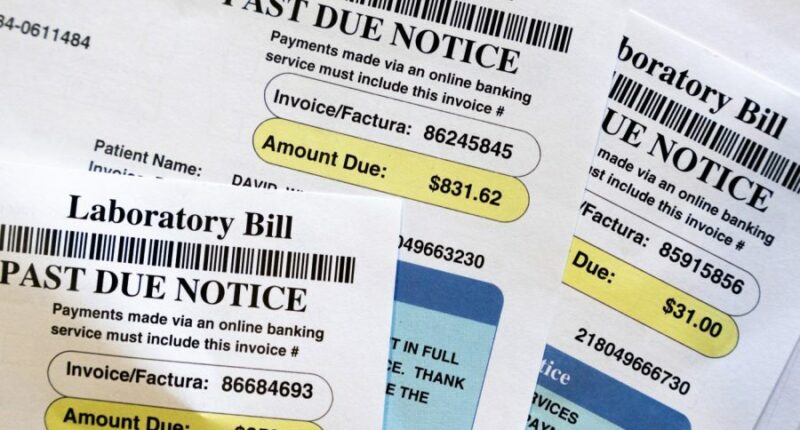Share this @internewscast.com

A recent poll reveals a significant concern among voters regarding the affordability of health care in the United States, with many expressing a willingness to consider health insurance systems that are not linked to employment.
The survey, commissioned by the nonprofit organization Undue Medical Debt, which aims to eliminate medical debt and advocate for policies that prevent its accumulation, was conducted by the nonpartisan research firm PerryUndem. In addition to the national poll, focus groups were engaged to gather more nuanced insights on the issue of health care.
Exclusive to The Hill, the findings indicate that a substantial 69% of voters perceive current health care costs as unaffordable, a sentiment that spans across political affiliations.
The poll also reveals that 35% of respondents currently have outstanding medical or dental debt. An equal percentage reported avoiding or postponing medical treatments within the past year due to concerns about incurring medical debt.
Participants were further inquired about whether they had to make any of eight specific sacrifices over the past year to achieve their financial objectives. These sacrifices included reducing food intake, foregoing vacations, increasing reliance on credit cards, falling behind on bills, and borrowing money from friends and family.
Survey participants were asked whether they made at least one of eight material sacrifices in the past year in order to meet their financial goals. These included eating less food, skipping vacations, putting more of their expenses on credit cards, falling behind on bills and borrowing money from friends and family.
Among those surveyed, 68 percent said they had engaged in at least one of those practices, with 43 percent saying they had eaten less or bought less expensive, less healthy foods.
One participant, a 43-year-old uninsured white woman in West Virginia, said in the survey, “I go to a food pantry and I work three jobs. You know what I mean? It’s hard, and it shouldn’t
be that hard. I don’t have time to spend with my kids. I don’t have time to do things, because
I have to work to eat, you know, and that’s what makes it hard for me.”
“This is a common ground issue that you know is resonating with people. Health care is clearly unaffordable,” Allison Sesso, president and CEO of Undue Medical Debt, told The Hill.
“What I thought was really interesting is really the focus on insurance,” added Sesso. “Seventy-four percent saying that insurance is failing to protect them from medical debt. And I think that that, to me, is a little bit new. Not that it’s new that insurance isn’t working that great, but that such a large percentage of voters on both sides of the aisle were pointing that out as one of the biggest failures.”
Sixty-three percent of participants said they blamed insurance companies the most for medical debt, which was very distantly followed by pharmaceutical companies at 12 percent and hospitals at 9 percent.
Seventy-six percent of voters said they agreed with the statement: “We need to switch to a different system of health insurance where people can change jobs or become self-employed and not have to worry about losing their health insurance.”
“They want to see a system that doesn’t tie them so tightly to their jobs, because it prevents them from moving around,” said Sesso. “And, you know, if you’re not sick, you’re sort of punished to stay at the job, and you don’t have the ability to be sort of self-employed, that you have to sort of hold on to that job for the insurance aspect of it.”
When it came to addressing medical debt, 76 percent said they wanted their states to pass laws shielding them from medical debt. Measures that received significant support included limiting the interest rate allowed on medical debt, limiting the ability of collection agencies to take a person’s belongings due to medical debt and requiring hospitals to use the same user-friendly application for financial assistance.
Eighty-one percent said they supported the creation of a state-funded health plan that would give residents a more affordable option than commercial plans.
Seventy-seven percent of voters said they would feel more positive about state elected officials if they passed laws with these measures, and 75 percent said they would be more likely to vote for someone if they passed these laws.
The ongoing discourse over health insurance and ensuring people can afford it is what is currently keeping the federal government shut down. The current shutdown is already the second-longest in U.S. history, and Democrats are refusing to budge unless a deal is struck to extend enhanced premium tax credits for Affordable Care Act (ACA) Marketplace plans.
“I’m not surprised that healthcare is at the center of this conversation. Medical debt and healthcare affordability are, you know, among the few issues where Americans actually agree at this moment,” said Sesso. “I think they’re not holding their breath for Washington to act and to protect them necessarily from medical debt, which is why I think they’re, you know, looking for states to take action.”
For the survey, 1,319 voters in the 2024 general election were included in a 12-minute national survey. The survey was conducted from Aug. 21 to Sept. 2. The results have a margin of error of plus or minus 3.63 percentage points.
















